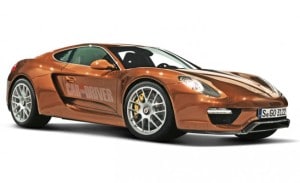Here’s an interesting article by William Boston of the Wall Street Journal: Porsche Tries to Remain Exclusive as Luxury Demand Surges. Porsche’s foray into bigger volume products such as the Cayenne and Macan sport-utility vehicles is fueling rapid growth of the iconic sports car brand, but it isn’t easy to grow fast and maintain high profit margins.
Sales of Porsche cars have risen nearly threefold since the launch of the Cayenne in 2002 and could exceed 200,000 cars this year.That’s tiny compared with Porsche’s parent, Volkswagen AG, whose namesake VW brand sold 4.6 million cars last year. But luxury brands like Porsche live from their exclusivity. While premium brands Audi AG, BMW AG and Daimler AG’s Mercedes-Benz brand ramp up production to grab volume, Porsche is applying the brakes—even as demand for its sports cars and SUVs grows.
“Our response is simple: we limit availability,” says Porsche Chief Executive Matthias Müller. That doesn’t mean that Porsche won’t sell more cars this year than last year. But ultra-luxury brands like Porsche and its rivals Ferrari SpA or Aston Martin Lagonda Ltd. need to find a way to balance certain contradictions. The more omnipresent their cars become through higher sales volume, the harder it is to charge a premium for an exclusive brand.
“If everyone drives a Porsche, it’s not exclusive,” says Porsche’s Chief Finance Officer Lutz Meschke. With the rise of emerging markets and expansion of the global middle class, the market for luxury autos is also becoming larger. Research group IHS Automotive predicts that in the decade to 2020 sales of ultra-premium brands will almost triple to 353,000 cars a year. This doesn’t include premium car makers such as Audi, BMW, and Mercedes.
“There are a growing number of professional and middle class people around the world who can afford these cars,” says Tim Urquhart, automotive analyst at London-based IHS Automotive.
Porsche’s rivals Aston Martin and Ferrari also see limits to growth. Ferrari is increasing production slightly from its self-imposed cap of 7,000 vehicles a year and has hinted that production could eventually get to 10,000 without hurting the brand’s exclusivity. Aston Martin, which sold about 4,000 cars last year, sees the line much lower.
“This is not a car company that is ever going to be selling a lot of cars. Part of its mystique is the exclusivity. I would argue the magic number for our production is right around 7000 units,” Andy Palmer, CEO of Aston Martin, told The Wall Street Journal in a recent interview.
The Cayenne, which went on sale in 2002, was the proof of concept that there is a large market for high-end luxury SUVs. The year the Cayenne launched, Porsche sold a total of 66,803 cars, of which 20,603 were the new Cayenne. Right from the start, the SUV made up nearly a third of Porsche’s total sales.
Last year, Porsche added the Macan compact SUV and sold 44,636 units the first year—although the car way only on sale for seven months of the year. This year, the first full year of availability of the Macan, sales are expected to be much higher, say analysts.
By the end of 2014, Porsche’s global sales had risen to 189,849 cars, 58% of which were Cayenne and Macan SUVs.
“If they wanted to chase volumes and be a 300,000 to 500,000 unit car maker they could do that,” says Mr. Urquhart. “More likely they won’t be chasing volume but will try to expand the brand.”
Porsche is making plans to develop a new model by the end of the decade and expects to announce details in the “not too distant future,” said Mr. Müller at the company annual news conference last week.
Mr. Müller hinted strongly that Porsche could develop a battery-driven car to challenge Tesla. “If at the end of the decade the time is ripe for a battery driven vehicle—then why not?” he said.
Porsche is unique in that it has its feet in both the ultra-luxury market and the premium market that is dominated by Audi AG, BMW AG and Mercedes-Benz. The Stuttgart-based sports car maker sells more cars than its combined ultra-luxury rivals Rolls-Royce, Bentley Motors, Aston Martin Lagonda, Bugatti, Ferrari, Automobil Lamborghini SpA, Maserati SpA, Maybach and McLaren Automotive Ltd., says Mr. Urquhart.
Audi’s Q5 SUV and Porsche’s Macan are based on the same architecture, yet the Macan commands a higher price and is more of a sports car in its performance and handling.
The new generation of Audi’s top SUV, the Q7, will go on sale in Europe in June and fetch a starting price of €60,900 ($64,371). That is not much less expensive than the entry Cayenne model, which starts in Germany at €65,427. The Cayenne is aging, though, and some analysts expect Porsche to significantly boost the price of the next generation.
Porsche sees its high price tag as competitive advantage, one of the factors that lends it exclusivity, and has no intention to sacrifice price for sales as the German premium brands have done.
“They’ve lowered the bar,” says Mr. Meschke. “But that would be deadly for us because it would taint our image of exclusivity. We don’t want to grow at any price.”
Porsche does pay a price for the growth of its SUVs. They sell more SUVs than classic sports cars, but the margins are thinner.
Porsche’s profit margin slipped to 15.8% in 2014 from 18% the year before—in part because of the growth in the share of SUVs in its sales.
“It is a fact that we earn less on the Macan,” says Mr. Müller.
Nevertheless, Porsche expects to achieve a profit margin of at least 15% this year and to sell more cars than ever before in its storied history. Commenting on the company’s forecast of boosting sales to 200,000 cars this year, Mr. Meschke takes on a nearly Zen attitude.
“It’s just a number,” he says, “not a target.”
—Eric Sylvers contributed to this article.








